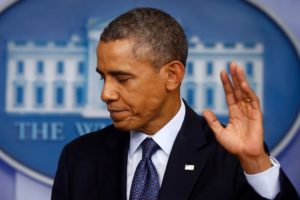As American military operations continue in Libya at a cost of $100 million per day, the President finally saw fit this past Monday to address the American people on the matter, after nine days of combat and not a word from our Commander in Chief since its inception.
The President began his twenty-minute speech by saying he wanted “to update the American people” on Libya, as though he had been speaking regularly on the subject, and his bizarre silence was simply a figment of our collective imagination. He then went into his case in chief against Gaddafi, reminding us that the Libyan dictator “has denied his people freedom, exploited their wealth, murdered opponents at home and abroad, and terrorized innocent people around the world – including Americans who were killed by Libyan agents.”
Of course, what the President left out is that Gaddafi’s awful history did not prevent the President from meeting with him, shaking his hand and eating pasta with him in July of 2009, during one of the President’s apologize-for-America-and-appease-global-dictators tours. Denis McDonough, a White House official at the time, said before the meal that Obama “doesn’t intend to choose which leaders he’ll shake hands with and which he won’t: he’ll be very happy to greet everyone he meets.” Even, apparently, murderous terrorists.
In any event, after setting out the case against Gaddafi, the President then attempted to persuade the American people that this mission was somehow in America’s interests, even though his own Defense Secretary, Robert Gates, had just the day before admitted that Libya “was not a vital national interest to the United States,” and did not “pose an actual or imminent threat.” But the closest the President came to contradicting Gates and identifying any concrete American interest(s) was to say that had we not intervened, thousands of Libyans would have been driven “across Libya’s borders, putting enormous strains on the peaceful – yet fragile – transitions in Egypt and Tunisia.” This is an awfully ironic justification, considering the President does not seem too concerned about the millions of people streaming across the Mexican-American border, placing enormous strains on the fragile American economy and social structure. But, if nothing else, it is encouraging to see the President is suddenly thinking about border security and illegal immigration, albeit in the wrong part of the world.
The President’s second, and impossibly even more tenuous justification, was that had we not acted, “The U.N. Security Council would have been shown to be little more than empty words, crippling its future credibility to uphold global peace and security.” But the illegitimacy and emptiness of the Security Council has already been well-established, in part because the same Gaddafi that the Security Council today condemns actually had a seat on the Security Council as recently as 2009!
Still, time and again, the President assured us that we need not fret because, after all, we are not in this conflict alone, but are joined by a “broad coalition” of “international partners.” What he neglected to mention is that these international partners include, amazingly, al Qaeda. Indeed, the Libyan rebel commander, one Mr. al-Hasidi, has said unequivocally that his movement has ties to al Qaeda, he has admitted fighting against American forces in Afghanistan, and had actually been detained by the United States as an enemy combatant until his release in 2008.
Of course, there’s nothing new about America rotating battlefield loyalties. The United States supported Saddam Hussein in the mid-eighties, before ultimately deposing him. The United States fought alongside the Soviet Union in World War II, before engaging the Soviets in a decades long cold war. And, of course, we fought two wars against Great Britain, one for our independence and one shortly after, before allying with them in two World Wars and a long-standing NATO alliance. Global interests constantly evolve.
But this is probably the first time in recorded history a country has decided to fight for and alongside its enemy in one war, while still fighting against that same enemy in the original, unfinished war. Oddly, the President’s speech made no mention of this, and barely mentioned al Qaeda at all, except to reassure us that “We are going after al Qaeda around the globe… wherever they seek a foothold.” Except, that is, in Libya, where we are helping them establish that very foothold.
Amazingly, this is perhaps not even the most perplexing element of Obama’s Libyan policy. Rather, most befuddling is the great contradiction of the new Obama Doctrine that posits that we should, on the one hand, go to war against a dictator, seek to “hold him accountable for his crimes,” and demand that he “step down from power,” while simultaneously agreeing to leave him in power. To that end, Obama has said we won’t kill Gaddafi even though we’re at war against him, largely because to kill him would alter the mission to one of regime change, and the President does not want this to become another Iraq. But by leaving Gaddafi in power, we are following exactly the same road we took in Iraq when we left Saddam Hussein in power after the first Gulf War, only to have him snub his nose at the international community almost immediately after, thereby crippling the credibility of Obama’s precious United Nations, and ensuring years more of the same sort of human rights violations that we now witness in Libya.
Sadly, as is often the case, the President’s speech left more questions than answers. If the mission is humanitarian, why Libya, and not Syria, the Sudan, or the Ivory Coast? If Gaddafi has $33 billion in assets that we’re freezing, why aren’t we using that money to reimburse ourselves for the cost of this mission? And why isn’t House Majority Leader John Boehner on every news network demanding that the President explain what constitutional authority he has to send our troops into battle without congressional approval?
In his speech, the President noted that he had “consulted the bipartisan leadership of Congress,” though not Congress itself, and the only sound heard from Boehner so far has been from his spokesman, who has said simply that the President needs to provide more “clarity” on the issue. Perhaps we’ve not heard from Boehner because he’s too busy crying over his own life story once again, or criticizing the Tea Party for demanding that congressional Republicans actually act like Republicans, or tinkering with his plan to save Social Security by simply refusing to allow some Americans to collect. Whatever the case, at a time such as this, when our representatives need to be asking tough questions of a President who is acting without congressional or constitutional authority, who refuses to give coherent, serious answers, and who is ceding America’s autonomy to international forces, John Boehner remains silent, proving once again that “Republican leadership” is a contradiction in terms.
Indeed, there has only been one strong opposition voice to the President’s actions, and it has not been from a Republican, but from a Harvard-educated constitutional scholar who said, very bluntly, “The President does not have power under the Constitution to unilaterally authorize a military attack in a situation that does not involve stopping an actual or imminent threat to the nation.”
The name of that constitutional scholar was Candidate Barack Obama, December, 2007.


